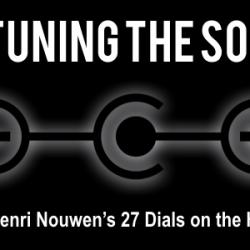 When my boys were little guys we would go out to eat every Friday evening. It was kind of our family tradition (still is)… eat a meal together, & try to connect at end of a long week. When they were young & squirmy my job was to find ways to keep them sitting down at the table & not running around, so I’d tell stories or play games.
When my boys were little guys we would go out to eat every Friday evening. It was kind of our family tradition (still is)… eat a meal together, & try to connect at end of a long week. When they were young & squirmy my job was to find ways to keep them sitting down at the table & not running around, so I’d tell stories or play games.
We would often go to this place called Jason’s Deli. While Kristin ordered at the counter while I sat with the boys and we would play. If the line was long at the counter, I would resort to doing this illusion-thing using the table-topper. Each table had these black metal frames on it, with a card advertising food specials. The top of the frame was open so I could slide the card easily up and down. I would hand both kids shaker of salt or pepper, slide the cardboard up, and ask them to place their shaker through the frame into my side. Then I would slide the cardboard back down, hiding the shakers. With my free hand I’d make them touch my hand & get a little “magic” in their fingers (at which point I grabbed both shakers, pinching them to the card. I’d say, “Touch the cardboard and say ‘abracadabra.’” They would comply, and I’d lift the cardboard straight up while hiding the shakers behind it as I did. It looked like they had vanished.
This trick blew their minds. Their eyes would grow large, they’d smile from ear to ear, and blurt out, “Daddy’s magic!” Then I’d lower the frame, reverse the process, reveal the shakers, and they would laugh, and laugh, and say, “How’d you do that?”
This would never work on adults but they were like three and five years old, so I got a good 9 months out of this trick before they caught on. Finally they did catch on, which was sad, because once you catch on to one illusion, you kind of catch on to them all. You never really buy an illusion after that first one. You wonder how they pulled it off, but not if it is really real.
And how they pull it off is, of course, how they’ve always pulled it off, because all Illusions always have the same 3 movements.
- The Pledge: The magician shows you something that he’ll vanish & then puts it behind a curtain, or handkerchief (vanish happ)
- The Turn: The magician will remove the curtain, or hanky, and the object has disappeared – but the illusion isn’t over yet.
- The Prestige: Where you reproduce the thing you vanished & everyone is amazed.
Every illusion has these three movements. There’s a philosopher & writer named Pete Rollins who says that part of what the church has done over the past few centuries is like a big illusion.
- The Pledge: is set up by a culture that knows that all humans are seeking two things… we’re seeking certainty and satisfaction. We want to feel certain, so we’re told stories about the world that convince us we know the truth about life. We want to feel satisfied, so we are constantly chasing some new thing that is the key to our happiness. Our culture present us with endless ways to be certain & satisfied.
- The Turn: is where the church makes those things vanish, by telling us that a better car, bigger house, prettier wife, new career won’t make us happy—all of which is spot on. The church throws a hanky over those things & they vanish. But then to complete the illusion, they need the Prestige.
- The Prestige: is where the church says you have to turn to God instead of those things & then you’ll feel satisfied & happy. The problem, as Rollins points out, is that the church has just substituted one product for another. We all want something to help us feel certain & satisfied, and we’re constantly offered products & philosophies by our culture that will help us feel those things. The church makes them disappear and then substitutes God. We are told that God will make us certain and satisfied.
This god functions exactly the same as a product or philosophy. Which means that eventually this god has the same problem that every business or product or philosophy has. It can’t deliver on its promise.
You are promised a God that will make you feel certain and satisfied. If you go for it, you probably get an initial buzz, but somewhere between 2 weeks & 2 years it wears off, and you realize that you still feel broken.
So the church does what any good company does: upsell you. They say you need to go to this camp, conference, or concert. Your problem is that you need a better church, or this program. You need to read this book or listen to this music, or whatever it is. And that’ll work for awhile, but will soon wear off. Then they’ll hand you something else that will never work, because it can’t work, because that kind of god is an illusion…
This is the illusion the church has played for centuries.
God is not some product that will make us whole & happy. In fact, any object we become convinced has the power to make everything all right is what the scriptures call an idol—a kind of illusion. So when we try to relate to a God of certitude and satisfaction, we’re not actually relating to God at all, we’re relating to an illusion of our own making… an idol.
God does not seem overly interested in giving us certainty or satisfaction—those things are illusions… idols. God is not found in running away from our uncertainty. God is found in the midst of our uncertainty & doubts & fears. God is not found in getting rid of our dissatisfaction & brokenness. God is found in the midst of our pain & our brokenness & our yearning.
The Christian story says God can always be found: as we experience God’s presence in the midst of our ordinary, everyday lives. This means God is in the laughter and the pain, but also the boring. God is in the highest highs, & the lowest lows, but also the mehhhh… All the brokenness, & the healing of the life we’re living here & now—that’s where God can be found.
Any promise of utter certitude, or satisfaction is an illusion.
In the scriptures when God’s people fall for an illusion, God would always call them back to faithfulness & remind them that the sacred isn’t a philosophy that gives us certainty. The truth is that we can be certain of very little in this life. God is not a product that satisfies our endless desire—because when does that ever happen? The sacred is the experience of God in the midst of our ordinary life.
The problem is: if we try to relate to a God that promises to make us certain & satisfy all our desires, we’re not relating to God, we’re relating to an illusion, an idol.
That’s a vending machine God: that dispenses certainty & happiness. but you have to make sure you use the correct change, and don’t push the wrong buttons. If you have to pull that change return lever, who knows if you’ll really get anything out of it.
That’s not the true God. That’s an illusion. Part of God’s mission of redemption is to ruin that illusion, to spoil the trick. Jesus’s whole ministry was spoiling the trick. It’s important, because if God can spoil the illusion for us once, really good. And then spoil it again & again & again. Maybe sooner or later we’ll stop chasing the illusion. And we’ll open up to the presence of the God who is always there.
Generally how God does this is he says, “Ok, if that’s what you really want, then go for it, see what happens… chase the idol. Go try and get your certitude. Go try and find your satisfaction.”
And we chase the idol, only to find that one of two things will happen. Either we’ll fail to get the thing we want, resulting in depression & sadness. Or we’ll succeed, but it won’t deliver, resulting in depression & sadness.
Oscar Wilde said, “There are only two tragedies in life: one is not getting what one wants, and the other is getting it.” Because when we finally get the right, job, spouse, kids, house, body, salary, church, theology, or friends, then we’ll soon see those things are an illusion. God will let us chase it for as long as we need until we finally give up.
The moment we stop believing that there is something out there that’ll give us certainty & satisfaction, is usually the moment we begin to see the God Who Is. The God Who Is wil be found not in the disdain of brokenness, but in the midst of the brokenness; not in the escape of the world, but in embrace of the world. The God Who Is will be found not when you have all the answers, but when you have the courage to face the questions; not in certainty & certitude, but in mystery & wonder & awe.
Encountering the God Who Is isn’t much a holding on as it is a being held; it isn’t as much a straining & striving as it is a letting go… and it’ll rarely happen as long as we hold to our illusions.
Under King David, Israel was one kingdom. But his son Solomon got so interested in certainty & satisfaction that he put Israel’s future in jeopardy. He started collecting things: wives, concubines, advisors, land, money. In order to meet his endless desires he pushed Israelites from the 10 northern tribes into a kind of forced labor. So they split into 2 kingdoms—ten tribes of the Northern Kingdom called Israel, and two tribes of the Southern Kingdom called Judah.
The Northern kingdom no longer worshipped at the temple in Jerusalem, they worshipped at what was called the “high places” in small shrines. And they organized under a new king named Jeroboam. He was a pragmatic king, wanting to make it easy for everyone to worship together. So he combined worship of YHWH & the local Canaanite gods, mainly Baal, the rain god, and Asherah, a fertility god. Jeroboam became known as the “man who made Israel to sin.” He was the first king to openly corrupt their worship and allow them to worship idols alongside YHWH.
But, the people liked him because he gave them exactly what they wanted. He satisfied their desires.
Years later king Ahab was on the throne, and he made the Northern Kingdom very successful. The economy was booming, and Ahab married a woman the Sidonian princess Jezebel. She brought with her prophets of Baal, Asherah, and customs of worship befitting those cults. These became the official gods of Israel. It’s strange to think about it, but the official god of Israel was no longer YHWH, but Baal & Asherah.
The people worshipped idols and illusions, that were supposed to satisfy their desires.
So YHWH called forth a prophet, Elijah, to call the people back to God; he told Ahab there’d be a big drought. This drought, as we discussed last week, was really just a way of saying Baal was impotent. Ball couldn’t do his one and only job: make it rain. Elijah had to run & hide, spending three years with the widow of Zarephath.
Jezebel was completely offended. She started killing the prophets of YHWH who were left in the land. There was a faithful man in charge of the palace named Obadiah. He hid 200 of the prophets in caves & kept them alive, but apparently Jezebel got to them. Finally YHWH told Elijah it was time to head back to confront Ahab. That is where we pick up the story.
1 Kings 18:
20 So Ahab sent to all the Israelites, and assembled the prophets at Mount Carmel. 21 Elijah then came near to all the people, and said, “How long will you go limping with two different opinions? If the Lord is God, follow him; but if Baal, then follow him.”The people did not answer him a word. 22 Then Elijah said to the people, “I, even I only, am left a prophet of the Lord; but Baal’s prophets number four hundred fifty. 23 Let two bulls be given to us; let them choose one bull for themselves, cut it in pieces, and lay it on the wood, but put no fire to it; I will prepare the other bull and lay it on the wood, but put no fire to it. 24 Then you call on the name of your god and I will call on the name of the Lord; the god who answers by fire is indeed God.”
So Jezebel comes with 450 prophets & Elijah comes all by himself, and the prophets of Baal start in with their worship. It was a mismatch.
Now the worship of Baal was a big show: very impressive, it was loud, & emotional, & people loved it. There was fire, smoke, incense, music, choreography, dancers, drama, & singing. It was a treat for all the senses. It was even a bit adrenaline packed. At one point the worshippers began cutting themselves—bloodletting—and spraying the blood in their frenzied worship.
Their worship was also very sexual & erotic. Sacred prostitution was a big part of the cults of Baal & Asherah. The emotions of the crowds were manipulated toward a moment of climax, and a mass response.
One begins to see that Baal worship was popular for a reason. This was low cost, high reward. It made few demands, and these folks put on a heck of a show. Is it just me or does this sound a lot like some churches in our society today? They gave the people exactly what they wanted, and the entire production was spectacular from top to bottom.
…only one problem: Baal didn’t send fire to consume the bull on its altar.
Elijah is anything but a gracious winner. He spends his time on the sidelines mercilessly taunting them. “Maybe your god is meditating.” One English translation suggests that perhaps their god needed to go to the toilet. “Maybe he has wandered away. Oh, I know! He is on a vacation. Or maybe he’s just asleep. Maybe you should yell a little louder and try to wake him up.” You can’t make this stuff up.
The priests of Baal went at it from morning until noon & finally quit in despair. Then it was Elijah’s turn.
Elijah turned calmly to the people and said, “Come closer to me.” He would not be yelling, or screaming. In fact he called the people together to speak softly to them.
30 …all the people came closer to him. First he repaired the altar of the Lord that had been thrown down; 31 Elijah took twelve stones, according to the number of the tribes of the sons of Jacob, to whom the word of the Lord came, saying, “Your name shall be Israel.”
Israel, if you remember is the name that God gave to Jacob. This happened when Jacob wrestled with God. In fact that’s what Israel means, “to wrestle with God.” And this, in fact, is the job of the prophet. The prophet reminds his people who they are, and to whom they belong.
Elijah says, “Life got hard for you and you bailed on YHWH. You started worshipping idols & you forgot who you are. You are the people who wrestle with God… you don’t roll over for some fantasy!”
This is the illusion the church in North America has been involved in for years. We have tried all kinds of things to try and get God to do what we want, to make God relevant to our own lives. Much of the worship of the contemporary church is shaped to make us Relevant. But, the prophets say, “We don’t try to make God relevant to our lives; we try to make our lives relevant to God.”
Eugene Peterson writes about this in his book The Jesus Way:
“Biblically formed people of God do not use the term “worship” as a description of experience, such as “I can have a worship experience with God on the golf course.” What that means is, “I can have religious feelings reminding me of good things, awesome things, beautiful things nearly any place.” Which is true enough. The only thing wrong with the statement is its ignorance, thinking that such experience makes up what the Christian church calls worship. The biblical usage is very different. It talks of worship as a response to God’s word in the context of the community of God’s people. Worship in the biblical sources and in liturgical history is not something a person experiences, it is something we do, regardless of how we feel about it, or whether we feel anything about it at all. The experience develops out of the worship, not the other way around.” The Jesus Way, P111
Peterson’s almost as cranky as Elijah—one of the many things I love about him—and Elijah was pretty cranky about the prophets of Baal & this spiritual high emotional experience they conjured.
Elijah never passed up on a chance to have fun at Baal’s expense. Baal’s popular name was Baalzebul, meaning “Lord & Prince.” Elijah’s name for Baal was Baalezebub, meaning, “Lord of the Flies.” He was poking fun of Baal’s inability to send rain. “Nothing growing here but flies. Maybe that’s what we should call you: Lord of the flies!”
The prophet insists that we worship God only, and that we refuse to try to make God meet our needs, which is much harder than one might think. Our entire society is predicated on the idea that we deserve to get what we want out of life.
And it’s just not possible…
If I’m really honest about what I want, this is what I’d have to admit. I want time to slow down. I want the passing of time to go slower. I want my kids to stay the same age they are right now because it’s so precious and good. I don’t want them to grow up and go away. (I hear this is what adolescence is for? By the time it’s over you are ready for them to go away?)
I would also say that I want everyone in our sweet church to be sober and whole. I want everyone to be kind and good to one another… and patient.
And I want my book to sell a million copies. So I can give most of the money away… and also pay off my house.
Do you think I’m going to get what I want?
And if by some miracle I could get exactly what I want, do you think it will it satisfy me?
So if I manufacture a God who’ll give me what I want, it won’t be a real god. But it’s hard for us to give up on this illusion because it goes completely against the grain of our culture that tells us we can have anything we want.
Think about Hollywood films. All Hollywood films operate on the assumption that if you can get the girl, kill the bad guy, win the game, or overcome the obstacle you’ll be happy. The film doesn’t end until that happens. But you know how the film never ends? …it never ends six months later when the hero finds himself sad and depressed, because the thing he was chasing didn’t satisfy him after all.
They never show the impotence of the idol. They show the dancing, music, the sex, blood, the emotion & the sizzle… they’ll show everything except the fact that Baal never sends fire to the altar.
Christianity blows this whole system apart because the experience of failure, the sense of loss we experience when we finally give up on all of the false stories we chase, will actually lead us to a place of great depth… and an awareness of the presence of a the God Who Is…
And that is prayer.
…and it only happens only when we realize our idols are impotent & powerless.
Most of our ideas about God end up being things we use to cover up the fact that we are all broken, and dependent, and scared. We want a solution to those things, so we develop a god who will help us feel less broken… less dependent… not so scared.
That kind of god is like a security blanket we give to our children. If a child is afraid of the dark, you give them a blanket and they’re not afraid anymore. Take the blanket away, and they are afraid again. The darkness hasn’t changed; it’s dark in both situations. All that changes is that when you take away the blanket, you take away the illusion. This illusion is an idol – it’s not real.
If you to take away the blanket & replace it with God… you make God into an idol… and you are worshipping an illusion.
Prayer is learning to sit in the dark, dealing with the fear; with the sense that we are broken; with the knowledge that we are dependent, and these things tend to make us feel scared. However, if we’ll sit with those thoughts, and try not to solve the tension with a security blanket God, then we will discover that God draws near to that kind of honest move.
If you admit your fears & failures, do you think God will turn away?
When we finally give up the worship of idols, and get down to what is really real in our lives, we will find God is present to us in ways we never imagine.
So Elijah prayed a simple prayer. “Lord, let it be known that you are God.” That was basically it. Let the people see who the real God is and who the idols are.
So, the lord consumed the altar.
And you know what? Nothing changed.
Ahab didn’t repent. The people didn’t turn back to the Lord… nothing changed. Elijah’s circumstances were pretty much the same. In fact the next day he went into exile again, which connects to week one of our series. He ran off into the wilderness & started to gripe & complain. He rested & waited & sat in the darkness of his cave. Finally he began to stop asking for God for certitude and satisfaction, and he stopped expecting God to do his bidding.
Just to punctuate the point God led Elijah to the mouth of the cave, and God put on a show of his own. First there was a massive earthquake… but God was not in the earthquake. Then there was a massive hurricane… but God was not in the hurricane. Then there was a massive fire… but God wasn’t in the fire.
Once Elijah finally let go of his expectations, the Lord came to him in the sound of something trying not to make a sound… the sound of silence. And this was the prayer that restored Elijah’s soul.
The first prayer at the altars had very little impact on Israel. Nothing changed. The second prayer seems to have impacted Elijah deeply.
Finally God gave Elijah those simple, straight forward instructions: “Go back the way you came.” It had to be a difficult thing to hear. “Go back to your ordinary life, Elijah, with all it’s dangers & troubles & uncertainties, and dissatisfactions… only this time know this: I am the Lord your God, I am real, I am the God Who Is, & I will be with you.”
When we pray to God, and we ask God to be something God isn’t… then we are really praying to an idol… an illusion. God will let us do that as long as we wish, but we know this will never satisfy us; never give us the certainty we want. Once we let go of our demands & let God be the God Who Is, then we will find ourselves in God’s presence & we can PRAY.
Eugene Peterson sums it up well:
“What Elijah did, and what his contemporary prophetic progeny does, is purge our imaginations of this world’s assumptions on how life is lived, on what counts in life. Over & over again, God the Holy Spirit uses prophets to separate his people from the lies and illusions they have become accustomed to and put us back on the path of simple faith and obedience and worship of the God and Father of our Lord Jesus Christ, in defiance of all that the world admires and rewards. Elijah and his vast company of prophets, by now centuries deep and worldwide, train us in discerning the difference between the ways of the world and the ways of Jesus, keeping us present to the Presence of God.”
Prayer is what happens when we stop demanding that God meet all our needs and just let God be the God Who Is for us. It is breathing in and out, and facing the brokenness of our lives, feeling the doubts an drear, experience all of the requisite dissatisfaction and weakness. Prayer is learning to be okay with the mystery, to entertain it with hospitality and calm. Prayer is trusting moment by moment that God has us, God holds us, God is working to redeem us, and this world. Prayer is you in the presence of the God Who Is, needing nothing else except allowing the reality of that presence to linger. Prayer is resting on the promise that god will one day wipe every tear from our eyes, and we will see him face to face, and we will live.
___________________________________
This is the sermon I gave last week at Redemption Church. I have to acknowledge how much I stole from Peter Rollins for this sermon. The illusion thing is his idea, I just changed it a little bit. The overall idea that satisfaction and certainty are not things human are capable of is his as well, as are some of the examples I used. I also used some language from my friend Rustin Smith, who is the pastor of Vox Dei. I also used a lot of Eugene Peterson’s chapter on Elijah from The Jesus Way.












